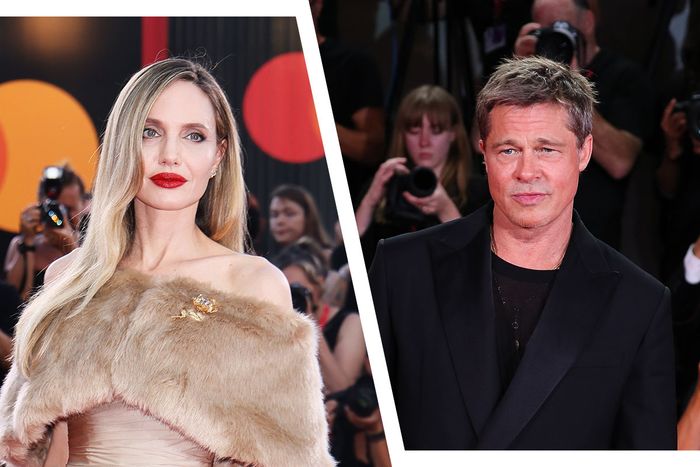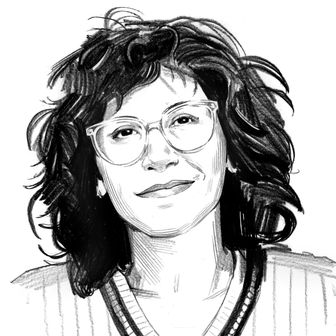
In 2007, Brad Pitt and Angelina Jolie walked the red carpet of the Venice Film Festival together, in attendance for Pitt’s movie The Assassination of Jesse James by the Coward Robert Ford, a melancholy western about ego and fading reputation. The film served as something of a launchpad for the two as film-festival darlings for the next few years. While they’d both seen a fair amount of mainstream, and even prestige, success in the early 2000s, their late-aughts run turned them into global and art-house superstars. They went — Jolie very pregnant with their twins — to Cannes for Jolie’s film Changeling in 2008, then back to Cannes in 2009 and 2011 with Pitt’s Inglourious Basterds and The Tree of Life, respectively. The pair then vanished from the international film-festival circuit until late August this year, when Jolie and Pitt returned to Venice separately, each with their own project, almost eight years after Jolie filed for divorce.
The former couple’s arrival on the Lido — a small island that hosts the event — was coordinated by festival artistic director Alberto Barbera, ensuring that they wouldn’t have to see each other, and it marked a new beginning for each of their public personas in the shadow of what has come to feel like a never-ending divorce. Though their separation was legally finalized in 2019, Pitt and Jolie have continued to feud over Château Miraval, the French winery they bought together in 2012. Upon their split, Jolie sold her shares to a subsidiary of the Stoli Group — the parent company of the vodka brand — which Pitt saw as an action that “sought to inflict harm.” (The sale blocked Pitt from obtaining majority-shareholder status.) It was only through the ensuing legal battle that the most shocking substance of the couple’s “irreconcilable differences” came to light: On a plane ride from France to California in 2016, Jolie’s filings alleged, an intoxicated Pitt had physically abused not only his wife, grabbing her by the head and shaking her, but two of their children, one of whom he choked and the other he struck in the face.
The details of this incident, which emerged in full in 2022, painted a vastly different picture from that of the Pitt who’d just a couple years before charmed his way through a successful Oscar campaign. He had spent the fall of 2019 and subsequent winter peacocking through joke-dense acceptance speeches and had reunited with his widely beloved ex-wife Jennifer Aniston backstage at the SAG Awards, maintaining what seemed like an effortlessly cool, semi-retired-dad energy (if said semi-retired dad were extremely handsome). Even the role for which he went on to win his Best Supporting Actor Oscar, in Quentin Tarantino’s Once Upon a Time … in Hollywood, played into his Elder Golden Boy persona: a no-frills former Hollywood stuntman, aging and hot — but without vanity — and wryly charismatic. (The character, somewhat ironically, suffers from the reputation of possibly killing his wife. Played for a laugh, of course.)
His then-shaky public relationship with his children, especially eldest Maddox, was framed in the media as a tragedy — for Pitt. As his Oscar campaign ramped up in the winter of 2020, the tabloids reported the actor’s apparent “heartbreak” when he was unable to make amends with his son during a trip to the U.K. for the BAFTAs. A few months after Pitt took home his Oscar gold, a screenshot from an Instagram Story posted by his son Pax made the rounds, in which he called his father a “world class asshole.” In the years since, all three of his daughters — Zahara, Shiloh, and Vivienne — have referred to themselves with the last name “Jolie,” no longer “Jolie-Pitt.” Shiloh made the change legal in June of this year. Pitt never retreated from the public eye, but his work has sharply declined. He had some financial success with movies like Bullet Train, but a failed Oscar run for Damien Chazelle’s Babylon placed him front row at the Golden Globes with nothing to do but smile at the winners all night. He began to betray a general world-weariness. In 2022, he admitted in a GQ interview that he saw his career on its “last legs”; the following year, he moved out of Hollywood to Carmel, California, a few hours up the coast.
Pitt’s return to Venice alongside George Clooney, with whom he stars in Jon Watts’s action-comedy Wolfs, was all smiles and jokes, appealing to a nostalgia for a time when the two headlined movies together — Steven Soderbergh’s Ocean’s trilogy and the Coen brothers’ Burn After Reading — and typified a suave and macho but nonthreatening masculinity. A recent story in GQ profiled the two as a pair, playing up their warmth for each other and by extension Pitt’s warmth as a person: “George Clooney and Brad Pitt are Hollywood BFFs.” In the press for Wolfs generally, including the glossy article (set at the Miraval estate) and the press conference at Venice, Pitt has used Clooney as a type of shield: Clooney the family man, Clooney the caretaker, Clooney the role model. “George is probably the best at understanding, seeing the chessboard and the potential moves. I’ll call George on numerous occasions when things get bumpy,” Pitt told GQ. Pitt appeared on the red carpet for the first time with Ines de Ramon, his relatively age-appropriate, non-entertainment-industry girlfriend of almost two years, but in the company of Clooney and his wife, Amal, Pitt still appeared more like a third wheel, a shaggy dog in need of some leftovers.
Jolie, meanwhile, arrived to the festival alone, promoting her new film, Maria, by Chilean director Pablo Larraín. Larraín’s biopic of opera singer Maria Callas is his third starring an American woman taking on an affected upper-class accent — following Natalie Portman in Jackie and Kristen Stewart in Spencer — and Jolie’s first project of relative prestige as an actor since her self-directed appearance in 2015’s By the Sea, which also starred then-husband Pitt. Maria puts Jolie back at center stage (not quite literally, as the film is set in Callas’s final years, though Jolie trained in operatic singing for the role).
Jolie’s aloneness at the festival did not appear to be the steely and “strong independent woman” type one might have imagined for an older, divorced Jolie years ago, during her stints as a “wild child” in the ’90s or an untouchable superstar in the 2000s. An early press still for Maria features Jolie in a strangely vulnerable pose, nervous or wary, holding her hands to the side of her head. At Venice, Jolie looked humbled, though not in the salt-of-the-earth way attempted by her ex-husband. On the red carpet, clad in neutral tans and blacks, her famous lips coated in classic red, she beamed with a kind of wide-mouthed, toothy eagerness, a far cry from the statuesque mugging she was known for in the early years of her relationship with Pitt. In the press conference for Maria, she discussed a guardedness that she felt she and Callas shared: “I think the way I related to her was probably the part of her that is extremely soft and doesn’t have room in the world to be as soft as she was, as emotionally open as she truly was.” That some of Jolie’s walls have now been dropped, whether by choice or not, was never more apparent than during the standing ovation at the film’s premiere, when the actress visibly shook before beginning to weep. She seemed genuinely overwhelmed, shell-shocked, shielding her face with her hand.
The consistency of Pitt’s persona over the years — the lucky, nice guy from Missouri who just happens to be a movie star — has made it easy, perhaps, for audiences to feel like they know him, what he’s about. Jolie, in contrast, has always maintained a vague unknowable quality that has perpetuated her stardom. She took the brunt of the heat in the couple’s early days — as the nepo baby, as the edgy “other woman” — and for the entirety of her career, she has been plagued by criticisms of being too cool, too removed. But at Venice, the pair’s public roles finally reversed. Jolie seemed, as much as anyone clad in custom designer chiffon and jewelry from Cartier could, down to earth: a woman who has been through something and who is actually present. Pitt’s persona, however, appeared more hollow than it ever had before. His posing glared against the reality of his private life, and the truth of who he is was very far away.
More on the Venice Film Festival
- Luca Guadagnino’s Queer Is More Challenging Than You Might Expect
- Julianne Moore and Tilda Swinton Are Perfectly Imperfect Together
- A Minute-By-Minute Breakdown of The Brutalist


